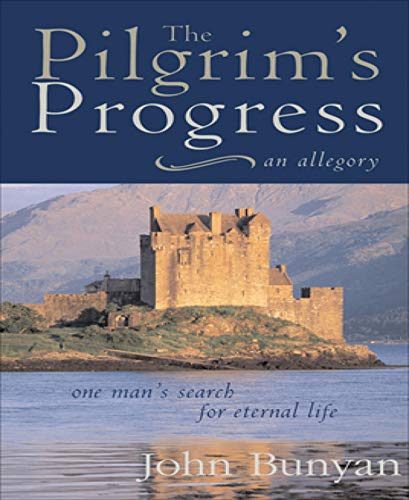-
Pilgrim's Progress
Tim Dowley, Steve Smallman
eBook (Candle Books, July 22, 2015)Share the adventures and perils of Christian as he sets out on the journey of his life. On the road he meets terrifying monsters, horrible giants, a cruel judge, raging lions and scary dark places. But he also makes good friends and, at last, reaches his journey's end - the Celestial City. Game also available.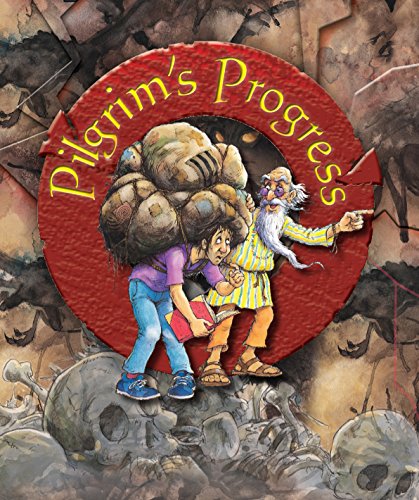
-
The Pilgrim's Progress
John Bunyan
Hardcover (B&H Books, March 1, 2017)The Pilgrim’s Progress was written by John Bunyan in 1678 and is an allegory on the Christian life. It is regarded by many as one of the most significant religious works ever written. This publication gives an added layer by providing thought provoking questions at the end of each chapter, to encourage the reader to dig deeper into the biblical truths present in this classic piece of literature.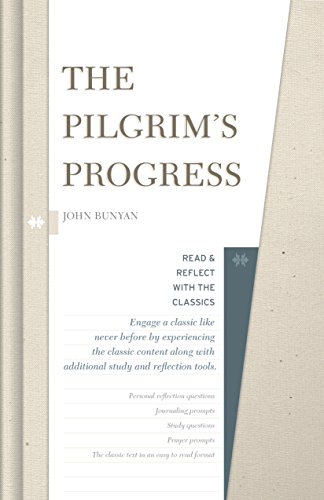
-
The Pilgrim's Progress
Steve R. Cleary, Robert Fernandez, Simon Vance, Dreamscape Media, LLC
Audiobook (Dreamscape Media, LLC, Oct. 26, 2019)Undoubtedly, John Bunyan's The Pilgrim's Progress is considered one of the most influential books of all time. For many, it is second only to the Holy Bible and has been enjoyed by generations for more than 340 years. This whimsical allegory follows the adventures of a man named Christian, who, after discovering a book and, subsequently, having a great burden grow on his back, journeys beyond the forbidden borders of his home in search of the Celestial City and its King.
-
The Pilgrim's Progress
John Bunyan
Paperback (CreateSpace Independent Publishing Platform, Oct. 27, 2018)The Pilgrim's Progress from This World to That Which Is to Come by John Bunyan is a bright example of the new Christian allegory of XVII century. The author, son of an ordinary sheet metal worker (rather despised job that had to done by the people with the lowest social status in England), John Bunyan used to be a sinner and ribald before marriage. Only after marrying an orphan Marry, whose only heritage was two books: Plain Man’s Pathway to Heaven by Arthur Dent and Practice of Piety by Lewis Bayly, he started his uneasy way to moral recovery. Considerably soon, Bunyan became a preacher. He was numerously chased by the authorities as well as English Church for his Christian views, baptistic in particular. He began writing The Pilgrim's Progress from This World to That Which Is to Come in prison. The book is questionable and contradictive but written very sincerely and persuasively. This work is probably one of the most famous allegories ever written. The book is translated into many languages. Protestants translated often the book into different languages as the second one after the Bible.
-
Pilgrim's Progress, The
John Bunyan
eBook (Dreamscape Media, June 5, 2018)The Pilgrim's Progress is a 1678 Christian allegory written by the Puritan preacher John Bunyan. Begun while Bunyan served a 12-year jail sentence for his nonconformist preaching, the novel unfolds over two parts, one concerning Christian, and the other his wife Christiana and their sons. Both concern the central characters’ ordeals in traveling from the worldly to the sublime, and are filled with allegorical characters with names like Hypocrisy and Prudence, and places like Plain Ease, and Doubting Castle. Considered one of the most significant works of religious English literature, it has been translated into more than 200 languages, and has never been out of print.
-
The Pilgrim's Progress
John Bunyan
eBookThe Pilgrim's Progress from This World to That Which Is to Come is a Christian allegory written by John Bunyan and published in February, 1678. It is regarded as one of the most significant works of English literature, has been translated into more than 200 languages, and has never been out of print.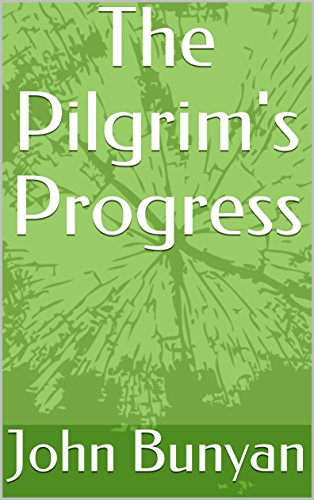
-
The Pilgrim's Progress
John Bunyan, Charles S. Baldwin
eBook (Digireads.com Publishing, May 29, 2016)John Bunyan was a man who felt, above all else, the need to preach the word of God. However during 17th century England it was illegal to preach outside the auspices of the Church of England. His failure to obey this law would land him in the Bedfordshire county jail twice, first for a period of twelve years, and then later for a period of six months. Bunyan could have avoided this harsh sentence if he had simply promised not to continue his preaching, however his faith would not allow him to do so. It was during this incarceration that he would begin composition of “The Pilgrim’s Progress,” a work that has come to be regarded as one of the most important works of religious English literature. First published in 1678, “The Pilgrim’s Progress” is a Christian allegory in the same vein of many such works of Bunyan’s time. It concerns the travel of an everyman named Christian who travels from his home, “The City of Destruction”, to “The Celestial City” atop Mount Zion. “The City of Destruction” is a parallel for this world and “The Celestial City” for the next. In this characterization the journey of Christian can be seen as the quest of man to escape the burden of Earthly sin and find salvation for his soul in heaven. This edition contains both the first and second part of “The Pilgrim’s Progress” and includes an introduction by Charles S. Baldwin.
-
The Pilgrim's Progress
John Bunyan, Michael Russotto, Audio Book Contractors, Inc.
Audiobook (Audio Book Contractors, Inc., March 29, 2012)Part One of this book tells of Christian's progress from this world to that which is to come. It is a dream of a dangerous journey fraught with doubt and constant struggles with sin. Part Two relates the story of how Christian's wife and children travel on the same road.
-
The Pilgrim's Progress
John Bunyan, C. J. Lovik, Mike Wimmer
Hardcover (Crossway, Sept. 11, 2019)Regarded as one of the most significant works of English literature, John Bunyan’s The Pilgrim’s Progress has encouraged, challenged, and fascinated Christians and non-Christians, young and old, for more than three centuries. Retaining the dignity and beauty of Bunyan’s original language, editor C. J. Lovik has updated key words and phrases, making the book more accessible to modern readers. Brought to life with 30 original, full-page, color illustrations by award-winning illustrator Mike Wimmer, this edition will help readers understand the joys and struggles of the life of faith on earth through the journey of Christian as he encounters Evangelist, Ignorance, Mr. Worldly Wisdom, and others on his way to the Celestial City.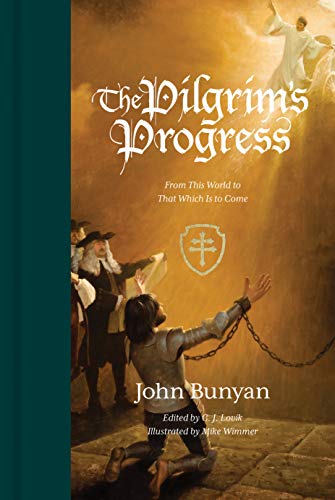
-
A Pilgrim's Progress
Geraldine McCaughrean, Jason Cockroft
Paperback (Hachette Children's, April 19, 2001)'I had a dream last night... large enough to fill the rest of my life.' This retelling of John Bunyan's classic story is filled with drama, excitement and adventure. On his journey of a life-time to the City of Gold, Christian meets an extraordinary cast of characters, such as the terrible Giant Despair and the monster Apollyon. Together with Hopeful, his steadfast companion, he survives the snipers and mantraps, the Great Bog, Vanity Fair, Lucre Hill and Castle Doubting. But will he find the courage to cross the final river to the City of Gold and his salvation? Q
Q
-
Pilgrim's Progress
John Bunyan, Steve West
MP3 CD (Brilliance Audio, May 7, 2019)Plagued by spiritual anguish, devout everyman Christian fears his fate in the sinful City of Destruction. He’s told that only by embarking for the Celestial City can he achieve personal salvation. After his wife and children refuse to join him, he sets forth alone into the unknown. Mocked for his faith, tempted at every turn, and heartened by fellow pilgrims, Christian’s winding journey toward grace unfolds. But as he reaches Mount Zion, his family chooses to follow the same treacherous path, hoping to join Christian in the shining light.John Bunyan began to write The Pilgrim’s Progress while in prison for nonconformist preaching. His dream-framed allegory, edited in 1909 by American clergyman Jesse Lyman Hurlbut, stands as one of the most profoundly influential novels ever written.Revised edition: Previously published as The Pilgrim’s Progress, this edition of The Pilgrim’s Progress (AmazonClassics Edition) includes editorial revisions.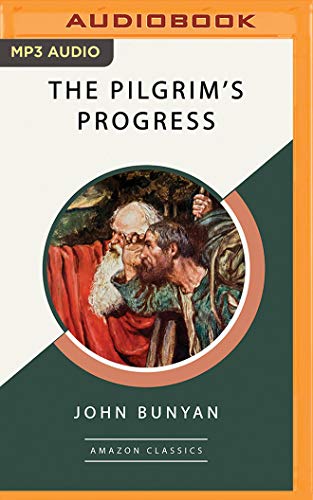
-
The Pilgrim's Progress
John Bunyan
eBook (BookRix, May 21, 2019)The Pilgrim's Progress from This World to That Which Is to Come; Delivered under the Similitude of a Dream is a Christian allegory written by John Bunyan. Christian, an everyman character, is the protagonist of the allegory, which centres itself in his journey from his hometown, the "City of Destruction" ("this world"), to the "Celestial City" ("that which is to come": Heaven) atop Mt. Zion. Christian is weighed down by a great burden, the knowledge of his sin, which he believed came from his reading "the book in his hand" (the Bible). This burden, which would cause him to sink into Tophet (hell), is so unbearable that Christian must seek deliverance. He meets Evangelist as he is walking out in the fields, who directs him to the "Wicket Gate" for deliverance. Since Christian cannot see the "Wicket Gate" in the distance, Evangelist directs him to go to a "shining light," which Christian thinks he sees. Christian leaves his home, his wife, and children to save himself: he cannot persuade them to accompany him. Obstinate and Pliable go after Christian to bring him back, but Christian refuses. Obstinate returns disgusted, but Pliable is persuaded to go with Christian, hoping to take advantage of the paradise that Christian claims lies at the end of his journey.